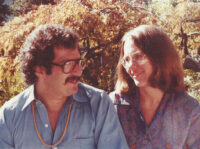So read a recent comment on one of my philosophical articles, and it’s a worthwhile question to contemplate. A friend of mine made a similar remark during a past conversation. “I like talking about practical things,” he said, indicating that philosophical talk was not useful. Yet another friend of mine called it “mental masturbation,” which made me think of a line by filmmaker Woody Allen: “Don’t knock masturbation, it’s sex with someone I love.” I feel the same way about philosophical inquiry. So what’s the point?
Whether consciously acknowledged or not, we all develop world views, and these in turn influence how we think and act. Often these views are so deeply embedded in individual psychology that seeing them in operation is nearly impossible; they form the underlying basis of how minds work.
The structure of language itself implies world views; our western languages of subject-verb-object, for example. By elevating subjects (nouns) to the active role in the stream of time and experience, we subordinate verbs, thus reinforcing a world view that includes independently existing selves and separated “things” while diminishing awareness of process and interconnectedness. Thus it is that objectifying others comes easily to us as does highly valuing inanimate and imaginary objects as real and autonomously independent. In this way “we” own the earth and everything upon it awaits our actions, even though nothing is permanent, including “we.”
Now, you may note, the preceding paragraph is philosophical; we are directing language at itself. The point is that the techniques of philosophy allow us to get outside of our own embedded frames of reference and potentially gain a different world view, if only for a moment. In such moments, when the hardened logic of our own world views opens a bit, the possibility of enlightenment seeps in. “There’s a crack, a crack in everything,” sang Leonard Cohen, “that’s how the light gets in.” Philosophy helps us pry open the crack.
Our scientific bent has been very successful at answering “how” but not as successful at answering “why.” “Why” is the province of philosophy, and it relies as much on intuition as reason. Our experience of the world is a combination of thought and feeling, and in our modern age thought has gained the upper hand. Our reliance on facts, despite that facts are only facts until they’re not, keeps us enthralled and arguing constantly. Facts are transient hypotheses really and are overturned regularly as we learn more about the physical world, for example. The world was flat, until it wasn’t. Time was fixed, until Einstein proved it wasn’t. Objects were solid, until it was determined that atoms are 99% empty space. You get the idea, but none of this answers “why.”
Intuition (and Buffalo Springfield) tell us that “something’s happening here, what it is’ not exactly clear.” We sense the world – see it, hear it, feel it, taste it, touch it – and then, thinking about it, develop stories to explain what’s going on using the logic of our world views; we then communicate our stories to others. Some stories are a big hit, get passed around and slowly become incorporated into new world views.
Why we think, why we know what we know, and why we know anything; that’s what interests me. Questioning the questions is the point. “What you write makes my head hurt,” I’ve been told. I’m glad to hear it.






Be First to Comment